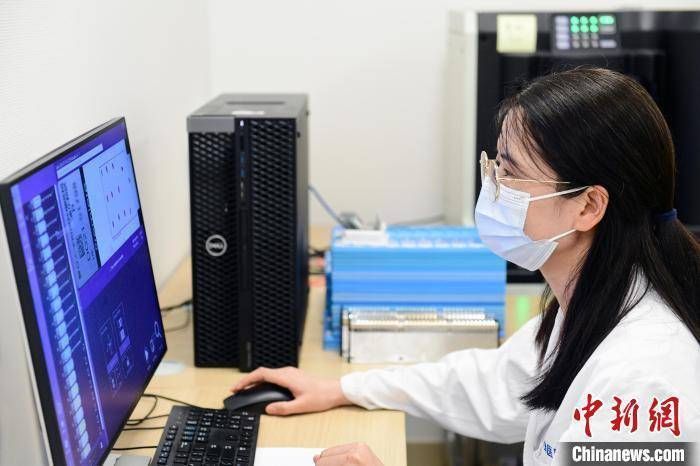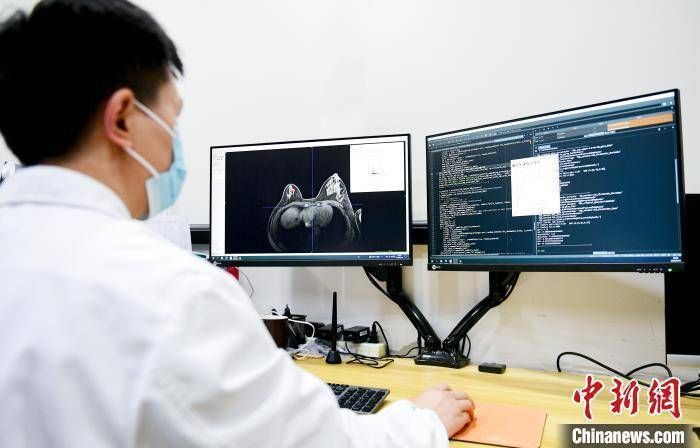This article is from: China News Network

Experts and scholars have found that imaging omics can Preoperative non-invasive and accurate prediction of triple-negative breast cancer type lays the foundation for subsequent precise treatment. Photo courtesy of Fudan University Affiliated Cancer Hospital
China News Service, Shanghai, July 20 (Chen Jing and Wang Yihui) Triple-negative breast cancer is known as “the most poisonous breast cancer”. The reporter learned on the 20th that Chinese medical experts have joined hands with the artificial intelligence technology team of universities to develop an “intelligent plan” for the clinical diagnosis of triple-negative breast cancer through the method of “multidisciplinary team cooperation in the hospital + cross-regional medical-engineering cross-cooperation”.
According to this intelligent solution, doctors can accurately predict the type of triple-negative breast cancer without trauma before surgery, laying the foundation for subsequent precise treatment; Key information related to treatment can be quickly obtained within hours, providing great convenience for precision treatment.
Professor Shao Zhimin, Director of the Precision Cancer Center and Director of Breast Surgery, Fudan University Affiliated Cancer Hospital, said, “In the near future, these two important research results are expected to be clinically applied and promoted in the Precision Cancer Center. There will be more inter-professional and multi-disciplinary research results incubating, and will be further transformed into clinical applications.”

Professor Shao Zhimin’s team, in conjunction with the team of Professor Gu Yajia, director of the Department of Radiological Diagnosis, Fudan University Affiliated Cancer Hospital, and the team of Professor Yang Wentao, deputy director of the Department of Pathology, and the team of Fudan University’s Brain-inspired Intelligence Science and Technology The related research results obtained by the research team of Wang He of the Institute and the team of Professor Xu Jun of Nanjing University of Information Science and Technology were published online in “Cell Reports Medicine”, a journal under the American “Cell” magazine, and “Basic Research”, a journal under the National Natural Science Foundation of China.
Professor Shao Zhimin said in an interview on the 20th: “Triple-negative breast cancer is a subtype of breast cancer. ‘The name of breast cancer. Accurately identifying triple-negative breast cancer, clarifying its molecular typing and key gene mutations is of great value for precise treatment.”
It is reported that in 2019, Fudan University Affiliated Cancer Hospital proposed The triple-negative breast cancer “typing”: triple-negative breast cancer is divided into 4 different subtypes, which makes it possible to treat different subtypes accurately. The identification of triple-negative breast cancer “types” depends on accurate pathological diagnosis and genetic testing reports.
In the interview, the reporter learned that in traditional diagnosis, a pathological diagnosis and genetic test report of triple-negative breast cancer usually needs to obtain tumor tissue through puncture or surgery, and undergo a series of processing and testing. can be obtained later. On the one hand, obtaining tumor tissue will inevitably bring physical trauma to the patient; on the other hand, the follow-up detection process is complicated and has many steps, requiring a lot of manpower, material and financial resources.
Relieving the suffering of patients from trauma, reducing the process and cost of accurate diagnosis, and knowing the accurate typing of triple-negative breast cancer as soon as possible have become the topics of exploration by medical experts.
A joint study by Prof. Shao Zhimin’s team, Prof. Gu Yajia’s team and researcher Wang He’s team from Fudan University’s Brain-inspired Intelligence Science and Technology Research Institute found and confirmed that radiomics can be used to prevent triple-negative breast cancer before surgery. trauma, and accurately predict its type. The research team “digitized” medical images and constructed a triple-negative breast cancer radiomics cohort. Professor Gu Yajia said that patients with triple-negative breast cancer can more accurately know the disease subtype only through enhanced magnetic resonance imaging examination.
Professor Shao Zhimin said: “These two studies are typical results achieved by the Precision Oncology Center of Fudan University Affiliated Cancer Hospital under the model of ‘multidisciplinary + medical-engineering’. Research innovations in precision tumor centers offer more possibilities.”